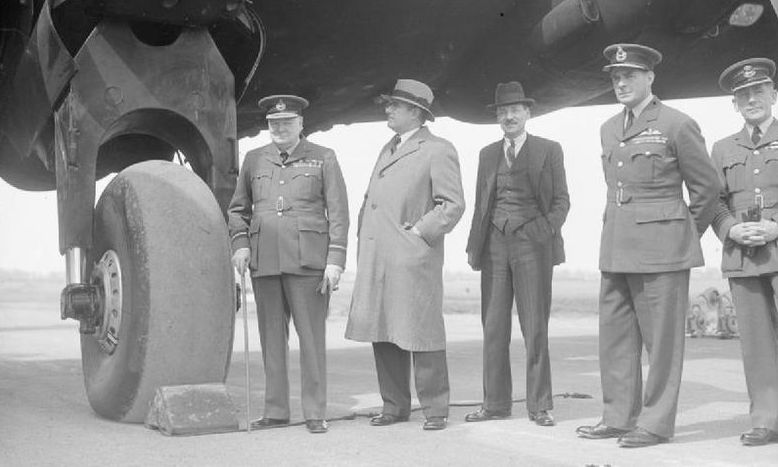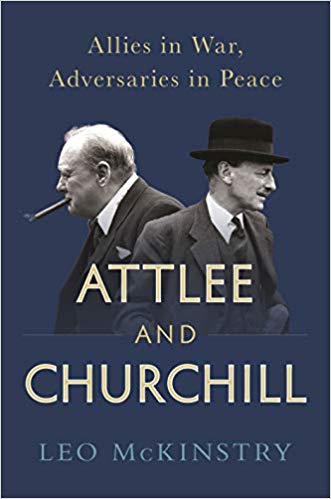
McKinstry’s Churchill and Attlee: A Vanished Age of Political Respect
Churchill and Attlee: Allies in War, Adversaries in Peace, by Leo McKinstry. New York: London, Atlantic Books, 736 pages, £25, Amazon $25.66. Excerpted from a book review for the Hillsdale College Churchill Project. For the original text, click here.
The McKinstry Epic
Leo McKinstry’s book 738 pages—twice the size of the previous Attlee-Churchill book and is riveting from cover to cover. Scrupulously fair, McKinstry tells the story, backed by a voluminous bibliography, extensive research and private correspondence. Thus he captures Churchill’s generosity of spirit, and Attlee’s greatness of soul.
“Sometimes turbulent, often fruitful, theirs was a relationship unprecedented in the annals of British politics,” McKinstry concludes. It was partly “a reflection of Churchill’s greatness, and partly of Attlee’s patience.” Attlee was the longest-serving party leader of the 20th century, Churchill one of the longest-serving prime ministers. In 1940-55, one of them was always PM.
There have been other great rivalries, but the bond between them was unique, especially for persons with such opposite views. One spoke for liberty and a “minimum standard” guaranteed by the State. The other declared himself a socialist, but practiced a far milder form of socialism than dialectic Marxists. In the war, Churchill had but one goal: defeating Hitler. Attlee, as Deputy Prime Minister (a position Churchill created expressly for him) ran the country. In doing so, he set himself up for his own premiership.
Contrasts and similarities
 Churchill lived luxuriously; Attlee mowed his own lawn and cleaned his roof gutters. Churchill drank champagne and spirits; Attlee went to bed with a cup of cocoa. Churchill holidayed in Monte Carlo, Attlee in Frinton. WSC had an exalted lineage, was hailed as a genius and pronounced a future prime minister. “No one,” says McKinstry, “ever discerned such a prospect for Attlee.” Clementine Churchill once called him “a funny little mouse.”
Churchill lived luxuriously; Attlee mowed his own lawn and cleaned his roof gutters. Churchill drank champagne and spirits; Attlee went to bed with a cup of cocoa. Churchill holidayed in Monte Carlo, Attlee in Frinton. WSC had an exalted lineage, was hailed as a genius and pronounced a future prime minister. “No one,” says McKinstry, “ever discerned such a prospect for Attlee.” Clementine Churchill once called him “a funny little mouse.”
Both wrote autobiographies, but Churchill’s My Early Life is a triumphal progress compared to Attlee’s As It Happened. The latter was described as “lamely written, clumsily constructed…as boring as the minutes of a municipal gas undertaking…. Not [exactly] Alcibiades or Churchill.”
Both were devoted to wives who were much alike: “fiercely loyal but often exhausted by the strain of public life.” Clementine suffered from neuritis, Violet from sleeping sickness. Clemmie was a lifelong Liberal. Vi only joined Labour five years after her husband became party leader.
Independent thinkers
Attlee and Churchill were Conservatives in their youth, and soon disillusioned with the Conservatives. H.G. Wells inspired Churchill’s belief in the need for the State to act as reserve employer and provide welfare assistance. But while Churchill joined the Liberals, Attlee joined Labour. Churchill became a crusading reformer, Attlee a welfare worker and activist in London’s East End. There he helped implement Churchill’s labor exchanges and National Insurance. Deciding that East Enders were “decent people who had been denied fair opportunities,” Attlee began questioning the whole organization of society. “The seeds of his socialism had been sown.”
Attlee and Churchill were patriots with faith in Britain and the Empire. Both fought in World War I, Churchill in Belgium, Attlee in Gallipoli. The latter always approved of that campaign. “I have always regarded the strategic conception as sound [but] it was never adequately supported,” Attlee said in 1960. Gallipoli made Attlee admire Churchill as a strategist. This paid dividends when they worked together a quarter of a century later.
Nailed to their respective masts
By the time the India issue arose in 1930, Churchill had returned to the Conservatives. Attlee believed in Britain’s role in India, but supported the reforms of the India Act, which Churchill stridently opposed. From across the aisle, Attlee offered a sympathetic appraisal. “Trouble with Winston: he nails his trousers to the mast and can’t climb down.”
Neither were they of the same mind about rearmament—particularly air power. Calling Churchill a “brilliant erratic genius,” Attlee referred to a Churchill book, The Aftermath. In it, he said, Churchill’s “brilliant imagination” envisioned control of military air power by the League of Nations! Churchill snorted that the Nazi threat demanded a national response. “I dread the day when the means of threatening the heart of the British Empire should pass into the hands of the present rulers of Germany.”
But Attlee had to mollify his left, which considered Churchill an “uncompromising right-winger.” Meanwhile, Absent Eden and Duff Cooper, McKinstry writes, “only Churchill was ready to stand with Labour.” But “that just emphasized how badly isolated he still was from the Tory political mainstream.”
The Great Coalition
World War II threw them together. McKinstry accurately describes the fateful May 1940 meeting when Attlee refused to join a national government under Neville Chamberlain. This effectively made Churchill prime minister. Attlee took criticism from his left, but responded: “I never believed that Winston had been hostile to the working-classes.”
“They jousted constantly,” writes McKinstry, “though Churchill, with his quicksilver tongue, usually had the last word against the leaden Attlee.” They frequently dined together. Yet Churchill did not invite Attlee to join The Other Club, saying he was not really “clubbable.” Politically, McKinstry explains, Attlee had “to perform a balancing act between the left of the party,” but would do nothing to undermine the Coalition. “I am sufficiently experienced,” he told the outspoken socialist Harold Laski, “to know that a frontal attack with a flourish of trumpets, heartening as it is, is not the best way to secure a position.”
Critic in chief
Their confrontations were pointed, but amusing. Once Churchill told the Cabinet: “Well, gentlemen, I think we can all agree on this course.” Attlee shot back: “You know, Prime Minister, a monologue by you does not necessarily spell agreement.” Sir David Hunt, a private secretary who served both, said Attlee would accept the explanation, “This is the way we have always done it.” But “you wouldn’t dare say that to Churchill.” He would instantly reply, “That is a very good reason for doing it differently this time.”
Attlee was not averse to telling off the PM in the bluntest language, albeit privately. By himself, he once banged out a letter on his battered typewriter. Churchill’s habits at meetings were disruptive, he complained. He was often unprepared, refusing to read the relevant documents. “I would ask you to put yourself in the position of your colleagues [and ask yourself whether] you would have been as patient as we have been.” Instead of blasting back, Churchill consulted his “familiars.” They all said Attlee was right. Clementine wrote: “I think that’s very brave of Mr. Attlee and I’m sure he’s representing the views of the Cabinet…and indeed all your friends and well-wishers.”
Tactics and strategy
They were united on the big things, but sometimes differed in detail. Early on, Attlee urged Churchill to repeal the 1927 Trade Disputes Act, which Labour hated. Churchill as Chancellor had helped pass it. He was sympathetic, but resisted, because he knew it would never get by the Tory-dominated House of Commons. In 1941, Attlee wanted to dismiss Horace Wilson, Chamberlain’s appeasement toady, as head of the Civil Service. Churchill calmly passed. He let Wilson retire gracefully in 1942—reversing the usual image of an impulsive Churchill vs. a careful Attlee.
McKinstry correctly represents (this writer is honored to be quoted) that it was Attlee, not Churchill, who authorized the fire-bombing of Dresden. He cites Stalin’s first question to Churchill at Yalta: “Why haven’t you bombed Dresden?” Attlee, McKinstry writes, had advocated mass bombing since 1940. He “had few qualms about this decision,” but later believed concentrating on specific targets would have been better.
By the last wartime summit conference in Potsdam, the election was on. Votes would be counted before the meeting ended. Churchill, confident of victory, courteously invited Attlee to accompany him. By the way, would Attlee like the services of one of his valets? McKinstry writes: “Attlee, socially conventional if politically radical, felt no guilt about accepting the offer.”
Attlee’s triumph
Before Potsdam in a campaign broadcast, Churchill said a Labour government would need to enforce its programs with “a kind of Gestapo.” The country disapproved of that language and Attlee took advantage. His responses contrasted Churchill the war leader and Churchill the party leader.
Attlee’s election victory shattered Churchill. Yet his basic decency triumphed over moroseness. “We have no right to feel hurt,” McKinstry quotes him. “This is democracy.” To a private secretary he advised: “You must not think of me anymore; your duty is to serve Attlee, if he wishes you to do so.” The secretary wept.
Like Churchill, Attlee had no compunctions about using the atomic bomb to end the war. He also consulted with Churchill over Anglo-American joint nuclear research. From Lake Como, nursing his regrets after the election, Churchill wrote Attlee: “My concern…is what the Americans will do. I apprehend they will be increasingly shy of imparting further developments.”
In the 1950s
Ardent socialists were not content with Attlee’s mild, businesslike leadership. Soon they were attempting to replace him. Attlee quietly pushed on with social restructuring and nationalization. Like Churchill, he supported the foundation of the State of Israel and opposed British membership in any form of federal Europe.
After the 1951 election Churchill returned to Downing Street. He regarded the Labour domestic record “a mess,” but would brook no criticism of his old deputy. Once at Chartwell, a local MP referred to “silly old Attlee.” Churchill thundered: “Mr. Attlee is a great patriot. Don’t you dare call him ‘silly old Attlee’ at Chartwell or you won’t be invited again.” His rival reciprocated—and then some. Churchill, Attlee said, was “the greatest leader in war this country has ever known, [who] stood like a beacon for his country’s will to win.” Once, after a 1962 Royal Academy dinner, Harold Nicolson recorded that Churchill, aged and feeble had almost to be carried out: “‘We may never see that again,’ said a voice behind me. It was Attlee.”
Ave atque vale
Attlee was in the Lords when Churchill died. Aging and enfeebled, he stood to address the House. “We have lost the greatest Englishman of our time,” he said. McKinstry quotes the Daily Mail: “Emotion choked Earl Attlee’s voice to near inaudibility as he described the tears rolling down Sir Winston’s cheeks when he spoke of the Nazi atrocities.”
Attlee and Churchill raises a question worth considering. Must politics always be a vicious cycle of name-calling and vituperation? Churchill and Attlee declare otherwise. They flung political charges back and forth, but never insulted each other. Whether on the same or opposite side, they went out of their way to share their views. They didn’t use the media to bludgeon each other—and likewise the media didn’t use them. Courtesy and respect do not mean surrender. We may learn from their example. We have a way to go.
Further reading on the Hillsdale College Churchill Project
Clement Attlee, “The Churchill I Knew,” Part 1.
Clement Attlee, “The Churchill I Knew,” Part 2.
Bradley P. Tolppanen, “Two Views of Churchill’s Relationship with Clement Attlee”






